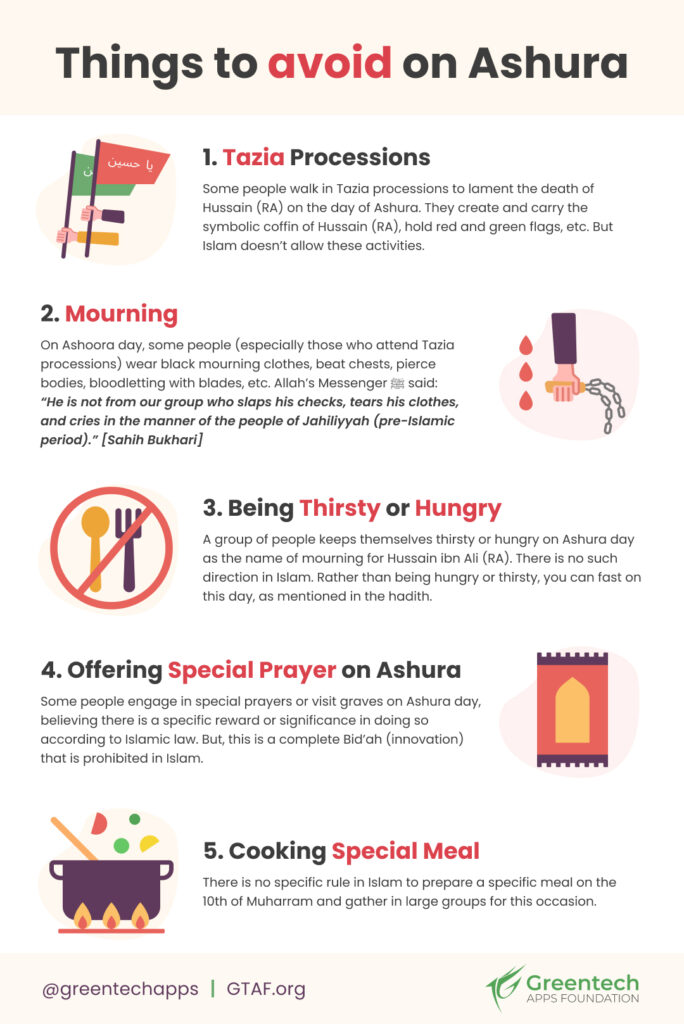What is the Day of Ashura: History, Significance, Do’s & Don’ts

The 10th of Muharram, known as Ashura, is a special and meaningful day for Muslims. It’s a day full of history, blessings, and important reminders.
On this day, Allah saved Prophet Musa (AS) and his people from Pharaoh. It shows us how Allah’s help and mercy can be. But Ashura isn’t just about what happened long ago, it’s also a day with big rewards.
Muslims worldwide fast on this day (along with the 9th or 11th), as it brings great reward. There are also some good things to do and a few things to avoid making the most of this blessed day.
Curious to learn more about the virtues of Ashura and how to observe it properly? Let’s dive in.
What Does Ashura Mean?
Ashura is derived from the root Arabic word ‘Ashara’, which means tenth. So, what is Ashura in Islam?
Ashura refers to the 10th of Muharram, which is the first month of is Hijri calendar. The Day of Ashura is also called ‘Yawm Al-Ashura.’
N.B. You can track important Islamic dates easily using the Sadiq app.
When is Ashura 2025?
Ashura is celebrated on the 10th of Muharram every year. This year, Ashura’s date is 5th July 2025. However, the date may vary depending on the region, as Islamic dates are based on moon sightings.

What is the Significance of Ashura in Islam?
Ashura is important for many reasons, such as
i. Ashura Lies on the Month of Muharram
In hadith, the month of Muharram is declared as the ‘Month of Allah’, which is also a sacred month in Islam.
The Messenger of Allah ﷺ mentioned the month of Muharram as the ‘Month of Allah’. [Sahih Muslim]
Another hadith says,
Abu Bakrah (RA) reported that Allah’s Messenger ﷺ said: “The year is twelve months of which four are sacred, the three consecutive months of Dhul Qa’dah, Dhul Hijjah, and Muharram, and (the fourth is) Rajab of (the tribe of) Mudar which comes between Jumaada and Sha’baan.” [Musnad Ahmad]
ii. Different Significant Events Happened on Ashura Day
Many virtuous things have happened on Yawm al-Ashura in Allah’s order that makes this day honourable. Some of the notable events of this day are-
- Allah saved Prophet Musa (AS) and the people of Israel from the oppression of Pharaoh.
- Nuh (AS) and his followers had a blessed life.
- Martyrdom of Hussain ibn Ali (R)
iii. Prophet ﷺ Gives Importance on the Day of Ashoora
Allah’s Messenger ﷺ said: “Fasting the day of ‘Ashura,’ I hope Allah will expiate the sins of the year went before.” [Sahih Muslim]

History of the Day of Ashura
The day of Ashura has a deep significant background. Some of the
a) Allah Blessed Prophet Nuh (AS) on Ashura
Prophet Nuh (AS) invited people to truth (Allah) for around 950 years. However, a few of the people only believed in Allah. Moreover, the people insulted Prophet Nuh (AS) and his followers in many ways. Then Allah SWT ordered Nuh (AS) to build an Ark for believers.
Afterwards, Allah sent a devasting flood on the earth, and only the passengers of the Ark lived. And finally, the flood ended, and the Ark landed on ‘Mount Judiyy’. Nuh (AS) and his companions got Allah’s mercy from such danger on the day of Ashura.
Imam Ahmad (RA) mentioned, “The Ark of Nuh (AS) came to rest on Mount Judiyy on this day (Ashura).” [Tafsir Ibn Kathir]
b) Allah Saved Prophet Musa (AS) and His People on Ashura
On the holy Ashura day, Allah gave freedom to Prophet Musa (AS) and the people of Israel from the oppression of Pharaoh.
Allah Subhanahu Wa Ta’Ala says in the Quran,
“Then We inspired to Musa, ‘Strike with your staff the sea’, and it parted, and each portion was like a great towering mountain. And We advanced thereto the pursuers. And We saved Musa and those with him, all together. Then We drowned the others (Pharaoh and his army).” [Sura Ash-Shuara, 26: 63-66]
In hadith, this is also mentioned,
“This (Ashura) is a great day when Allah saved Musa (AS) and his people and drowned Pharaoh and his people.” [Sahih Muslim]

c) Ashura and Other Prophets (AS)
Abdul Qadir Jilani (RA) wrote in his book Mukhashfa al-Qulub that many Prophets (AS) had to go through significant events on Ashura, such as
- Adam (AS): Allah forgave him and accepted his repentance.
- Ibrahim (AS): Allah extinguished the fire he was thrown into.
- Ayyub (AS): Allah ended his long and patient test, restoring his health, wealth, and family.
- Sulayman (AS): Allah granted him a vast kingdom and power over natural forces.
- Yunus (AS): Allah rescued him from the belly of the whale and forgave his people.
- Isa (AS): Allah raised him to the heavens.
Note: These events aren’t mentioned in Hadith. This might be the research of Abdul Qadir Jilani (RA). Allah knows the best.
d) Martyrdom of Hussain Ibn Ali (R)
Hussain Ibn Ali (R) was the grandson of Prophet Muhammad ﷺ and the son of Fatima (R) and Ali (R). Allah’s Messenger ﷺ loved Hussain (R) and his elder brother Hasan (R) very much.
The Messenger of Allah ﷺ said, “Whoever loves me and these two [Hasan (R) and Hussain (R)], along with their mother and father, they will be with me on the Day of Judgement.” [Jami at-Tirmidhi]
Hussain (R) was on the right path and always stood against falsehood and oppression. During his time, Yazid Ibn Muawiya was announced caliph by the early caliph Muawiya (R), who was Yazid’s father. But Hossain Ibn Ali (R) and many other prominent companions of the Prophet (R) denounced Yazid’s caliphate.
That’s why Yazid tried to take pledge allegiance in different ways, but Hussain (R) always refused it. The people of Kufa wrote Hussain ibn Ali (R) that they were ready to pledge allegiance to Hussain (R). Thus, Hussain (R), with his family members and companions, departed for Kufa. Following this, Hussain (R), his family members (R), and followers (R) were martyred by Yazid’s army led by Ibn Sad in the Karbala. And the day was the 10th of Muharram (Ashura).
Note: Hussain (R) was martyred after the death of Prophet Muhammad ﷺ. And it’s not directly related to the history of Ashura. However, we’ve included this topic here as Hossain Ibn Ali (R) was martyred on the blessed 10th of Muharram.
e) Other Events That Happened on the Day of 10th Muharram
Imam Al-Ghazali (R) wrote in his Mukhashfa al-Qulub about the significance of the noble Day of Ashura. He highlighted several noteworthy events associated with this day:
- Allah created the skies, earth, and the Preserved Tablet.
- Angel Jibril (AS) was created.
- Adam (AS) and Hawa (As) were created.
- Jannah was created.
- Adam (AS) and Hawa (AS) were enabled to live in Jannah.
- The first rainfall on earth occurred.
Note: These events aren’t mentioned in Hadith. This might be the research of Abdul Qadir Jilani (R). Allah knows the best.

Good Deeds to Do on Ashura
Have you wondered how Ashura is celebrated? There are no specific rules in Islam to observe Ashura except fasting on this day. Some people, especially Shia (a deviated sect), do many wrongdoings in this day that aren’t part of Islam.
Here we’ll give you a list of righteous deeds that you can do on this day.
1. Fasting on the Day of Ashura
If you want to observe the Day of Ashura, the most important thing to do is fasting. Fasting on the Ashura expiates the previous year’s sins (minor) as mentioned in the hadith.
Our beloved Prophet Muhammad ﷺ said: “Fasting the day of ‘Ashura,’ I hope Allah will expiate the sins of the year went before.” [Sahih Muslim]
Ibn Abbas (R) narrates that he was asked about fasting on the Day of Ashura (10th Muharram). He said, “I did not see the Messenger of Allah ﷺ fast a day while more avid to seek its virtue than this day (Ashura).” [Sahih Bukhari, Sahih Muslim]
So, how do you fast for Ashura? This is mentioned in several hadiths-
Allah’s Messenger ﷺ said, “When next year comes, we will fast the Ninth (with the 10th of Muharram) if Allah wills.’ But the next year did not come before the Messenger of Allah ﷺ passed away.” [Sahih Muslim, Sunan Abu Dawud]
Ibn Abbas (R) that the Prophet ﷺ said, “Fast on the day of Ashura and one more day before or after Ashura to avoid the likeness of the Jews.” [Musnad Ahmad]
So, you should fast on the Ashura (10th of Muharram) day with either the 9th or 11th of Muharram (total of two days) to distinguish from Jews fasting. Some scholars also say to fast for three days (9, 10, and 11 Muharram). But, if you are unable to fast for two days, fast at least on Ashura day.

2. Seek Allah’s Forgiveness
The Prophet ﷺ said to a man, “If you want to fast a month after Ramadan, then fast Muharram, for it has a day in which Allah forgave an entire people, and He turns to others in repentance in.” [Jami at-Tirmidhi]
According to the Lat’if al-Ma’arif, the day is the 10th of Muharram. So, we should focus on special repentance on the day of Ashura for our previous sins to get Allah’s forgiveness. Our dua app may help you to find good duas for Ashura.
3. Giving Charity
Giving charity is a righteous deed. And if you do it on a holy day like Ramadan, Dhul Hijjah, or Ashura, this will give you an extra reward insha’Allah.
Abdullah ibn Amr ibn As (R) said: “Fasting on Ashura is equivalent to fasting the whole year, and giving charity on this day is equivalent to giving charity for the whole year.” [Lat’if al-Ma’arif]
You are encouraged to donate to GTAF as a part of Sadaqah Jariah. This will help us to reach more people with the message of Islam.

4. Doing Worship
We’ve said earlier that there are no special events on Ashura day except Fasting. However, you can do more voluntary worship on this day. Some of them could be
- Voluntary prayer
- Reciting Quran
- Showing good behaviour with others
- Knowing the history of Ashura and the martyrdom of Hussain ibn Ali (R)
5. Call People on the Right Path
Giving Islamic Dawah is Fard. Some people do wrong practices and Bid’ah activities during Ashura. So, we can make people aware of these. It is our duty to spread the true teachings of Islam to all.
Is Ashura Fasting Fard?
No, fasting on Ashura isn’t fard (obligatory); it’s Nafl (voluntary). But, fasting on the day of Ashura was obligatory (Fard) for Muslims before fasting on Ramadan was made obligatory. Now fasting on Ashura is Nafl (voluntary) but has a great reward.
Here is a brief evolution of the rule of fasting on Ashura day.
a) Prophet Musa (AS) fasted on this day as a thanksgiving to Allah as he and the people of Israel were freed from the Pharaoh on this day. Later on, Jews, pre-Islamic Arabs, and even the Prophet Muhammad ﷺ before prophethood used to fast on this day, as mentioned in both Sahih Bukhari and Sahih Muslim.
The mother of believers, Aisha (R) said, “The people used to fast on ’Ashura before the fasting of Ramadan was made obligatory. And on that day, the Ka‘bah used to be covered with a cover.” [Sahih Bukhari]
b) After Hijrah (migration), Allah’s Messenger ﷺ and his companions (R) used to fast on the Ashura day (10th Muharram) as obligatory.
Ibn Abbas (R) said, ’The Prophet ﷺ migrated to Madinah and saw the Jews fasting on the day of Ashura. He ﷺ said, ‘What is this?’ They said, ‘This is a righteous day; it is the day when Allah saved the Children of Israel from their enemies, so Musa (AS) fasted on this day’. He ﷺ said, ‘We have more right to Musa (AS) than you’, so he ﷺ fasted on that day and commanded (the Muslims) to fast on that day.” [Sahih Bukhari]
c) But when the fasting of Ramadan was made obligatory, the Messenger of Allah ﷺ and his companions (R) fasted on this day as Nafl (voluntary). The following hadith supports it.
Ummul Mu’minin Aisha (R) narrates in a hadith, “Allah’s messenger ﷺ ordered (the Muslims) to fast on the day of ‘Ashura, and when fasting in the month of Ramadan was prescribed; it became optional for one to fast on that day (Ashura) or not.” [Sahih Bukhari]
d) And finally, The Messenger of Allah ﷺ says to make Ashura fasting dissimilar to Jews by adding one more fasting with it,
Ibn Abbas (R) that the Prophet ﷺ said, “Fast on the day of Ashura and one more day before or after Ashura to avoid the likeness of the Jews.” [Musnad Ahmad]
The Messenger of Allah ﷺ said, “When next year comes, we will fast the Ninth (with the 10th of Muharram) if Allah wills .’ But the next year did not come before the Messenger of Allah ﷺ passed away.” [Sahih Muslim, Sunan Abu Dawud]
So, now Muslims fast on Ashura as Nafl. It’s not Fard.

Things to Avoid on Ashura
The day of Ashura is undoubtedly an important day for Muslims. However, some people, especially Shia (a deviated sect), do some forbidden and superstitious activities on this day to memorize or mourn Hussain ibn Ali’s (R) martyrdom. As Muslims, we all love the Prophet’s ﷺ grandson Hussain (R), but we shouldn’t do such activities that are not permissible in Islam.
Unfortunately, some people do a few wrong things on Ashoora days that have no proof in Islam. So, we should avoid these. Some of these activities include-
i) Tazia Processions
Some people think the month of Muharram is an unlucky month. Thus, they avoid public displays like weddings or other cheerful events before the 10th Muharram. But, these people walk in Tazia processions to lament the death of Hussain (R) on the day of Ashura. They create and carry the symbolic coffin of Hussain (R), hold red and green flags, etc. But Islam doesn’t allow these activities.
This tradition is derived from Shia (a deviated sect in Islam). As Muslims, we shouldn’t join such processions anyway for mourning.
It’s not permissible in Islam to mourn for more than three days (except for the wife mourning for her husband’s death).
Allah’s Messenger ﷺ said: “For a woman who believes in God and the Last Day, there is for her three dead bodies other than her husband.” It is not permissible to mourn for more than three days for any dead person except her husband. However, she will mourn for her husband for four months and ten days.” [Sahih Bukhari, Sahih Muslim]
So, how can we mourn for Hussain (R), who was martyred almost 1400 years ago?
Note: According to Islamic Shariah, mourn means refraining from adornment. So, in the name of mourning, you can’t do anything except that.

ii) Mourning
On Ashoora day, some people (especially those who attend Tazia processions) wear black mourning clothes, beat chests, pierce bodies, bloodletting with blades, etc. No doubt, the martyrdom of Hussain (R) is a tragic story for Muslims, but we shouldn’t do anything that is against Islam. Prophet ﷺ prohibited mourning ceremonies for any person, as it was a practice of the ignorant people in pre-Islamic times.
Allah’s Messenger ﷺ said: “He is not from our group who slaps his checks, tears his clothes, and cries in the manner of the people of Jahiliyyah (pre-Islamic period).” [Sahih Bukhari]
In another hadith, the Messenger ﷺ of Allah said, “I am free from the person who shaves his head, beats his chest, and tears his clothes in grief.” [Sahih Muslim]
Rather than mourning, we should be patient and make dua for Hossain (R), the Martyrs of the Karbala, and other Muslims. You can read this Fatawa to know more about the Ashura celebrations.
iii) Being Thirsty or Hungry
A group of people keeps themselves thirsty or hungry on Ashura day as the name of mourning for Hussain ibn Ali (R). There is no such direction in Islam. Rather than being hungry or thirsty, you can fast on this day, as mentioned in the hadith.
iv) Offering Special Prayer on Ashura
Some people engage in special prayers or visit graves on Ashura day, believing there is a specific reward or significance in doing so according to Islamic law. But, this is a complete Bid’ah (innovation) that is prohibited in Islam.
v) Cooking Special Meal
There is no specific rule in Islam to prepare a specific meal on the 10th of Muharram and gather in large groups for this occasion.
FAQs about What is the Day of Ashura
Q. Is it permissible to celebrate Ashura?
Ans: There is no special celebration on the day of Ashura except fasting. To learn more about this, you can read this Fatwah.
Q. Why do Muslims fast on Ashura day?
Ans: Prophet Muhammad ﷺ used to fast on this day as Allah saved Musa (AS) and the believers from Pharaoh. Following the Sunnah of Allah’s Messenger ﷺ Muslims fast on this day.
Q. How many days should you fast for Ashura?
Ans: You should first at least on the Ashura day (10th Muharram). But this is Mustahab to fast either the 9th or 11th Muharram with the Ashura day.
Q. Will the universe be destroyed on the day of Ashura?
Ans: This is not correct that the universe will be destroyed on Ashura day.
Final Words
The month of Muharram is itself virtuous as it is one of the four sacred months in Islam. Moreover, the significance of Ashura makes this month and the day of the 10th Muharram so honourable.
It is recommended to fast on Ashura day, adding one more day before or after this day. Also, refrain from sinful acts like Tazia processions, piercing bodies, and bloodletting, etc. May Allah give us Tawfique to observe the day of Ashura in the right way.


